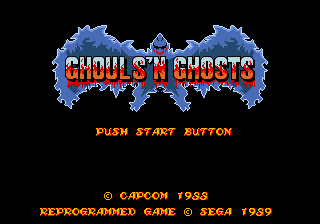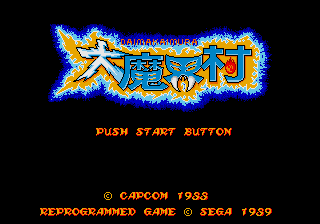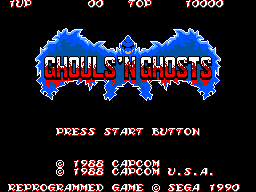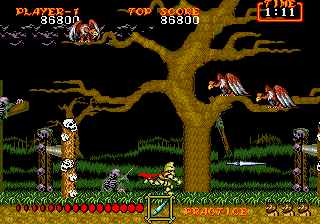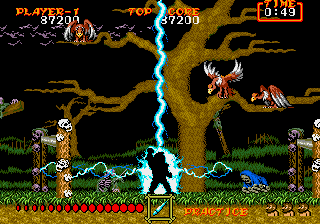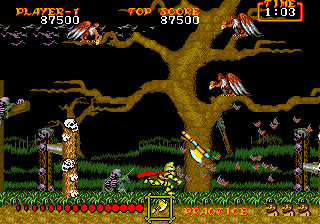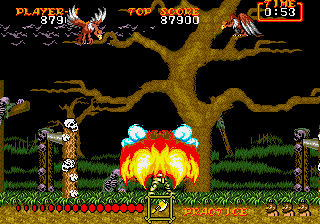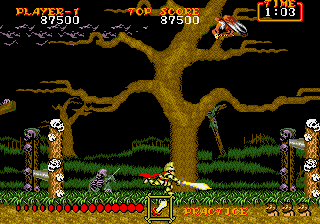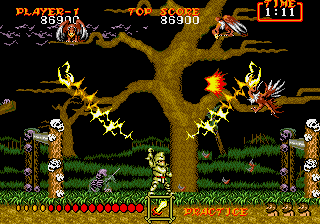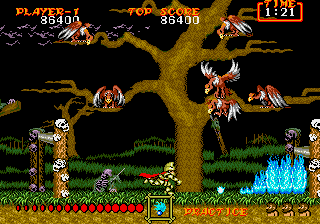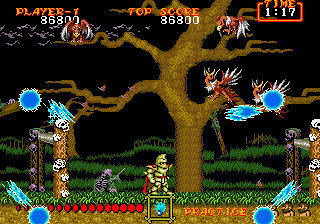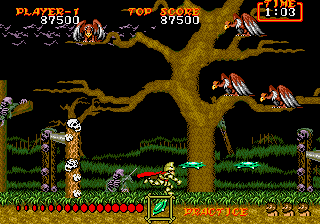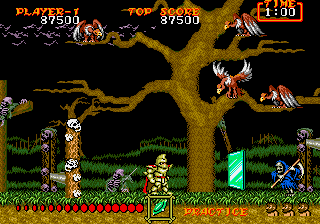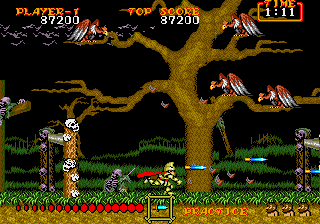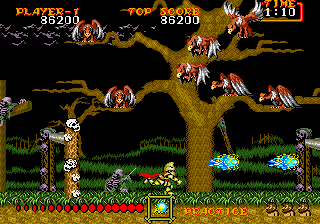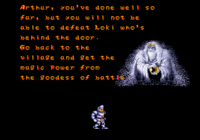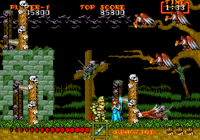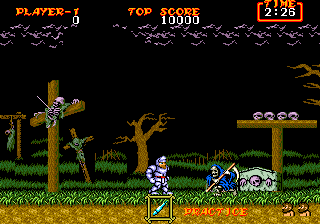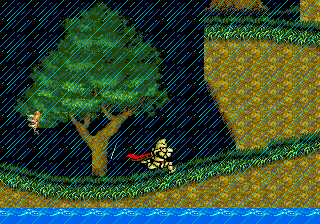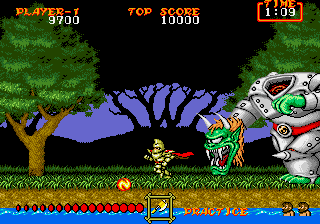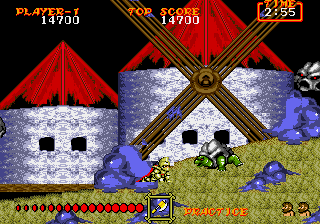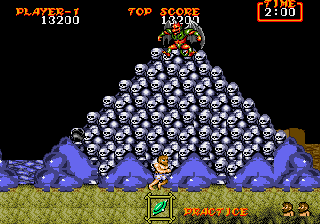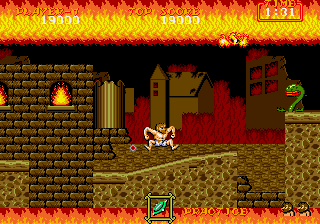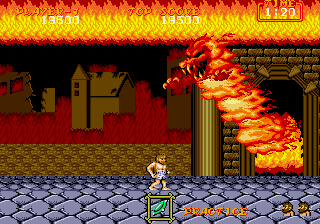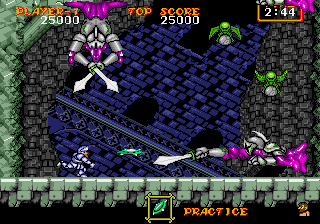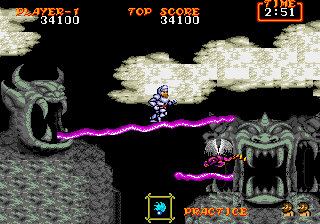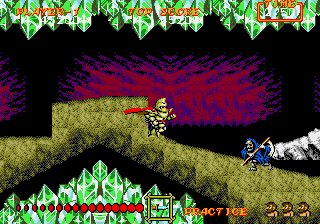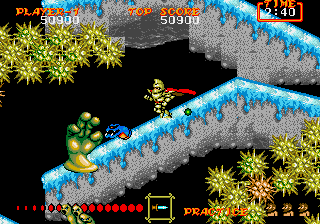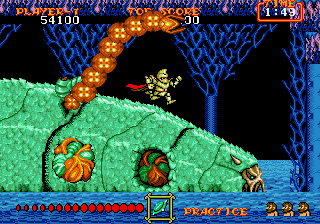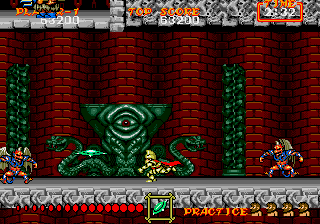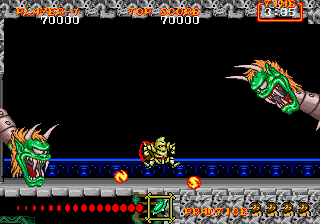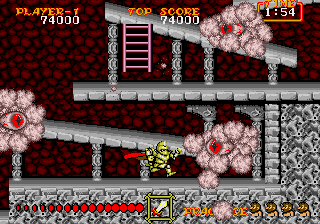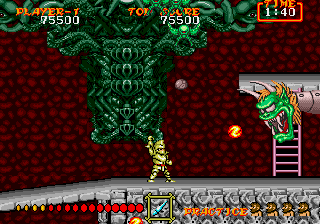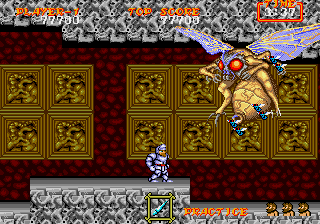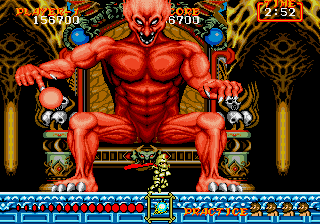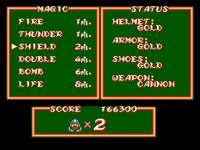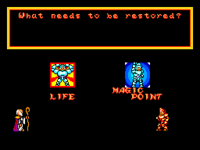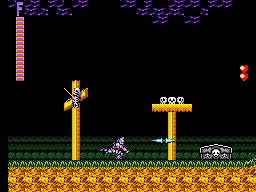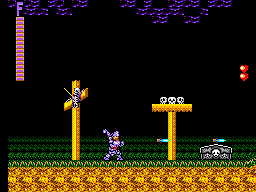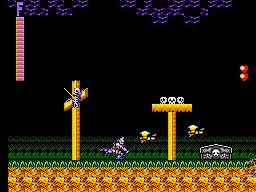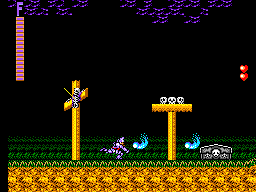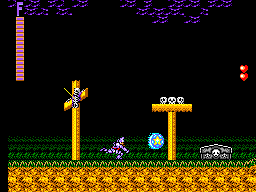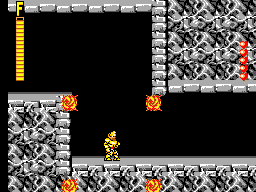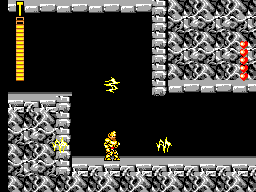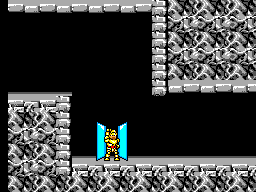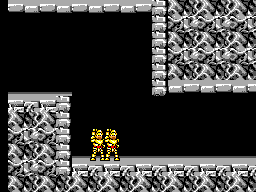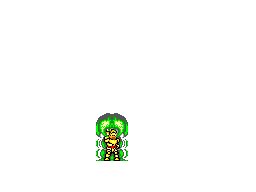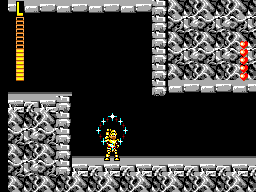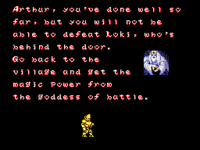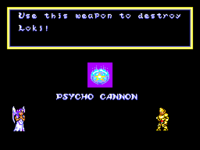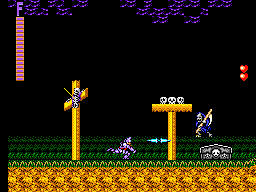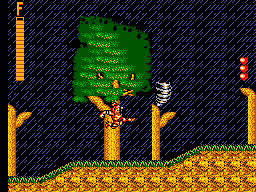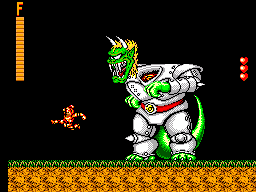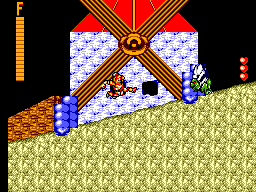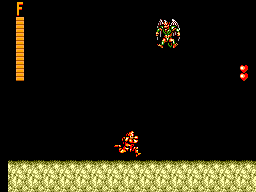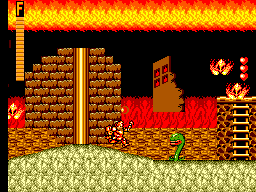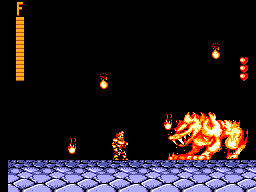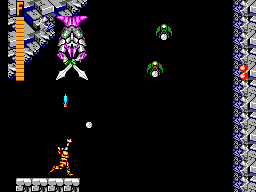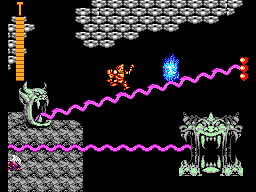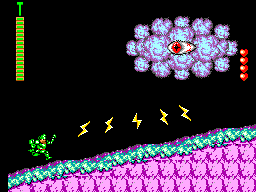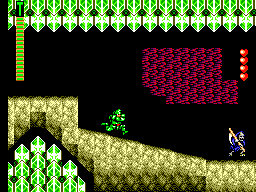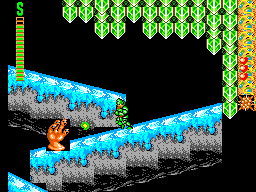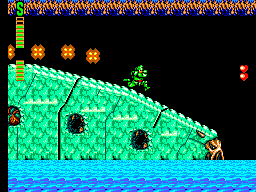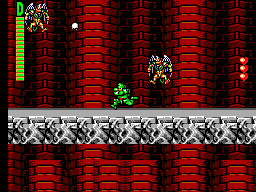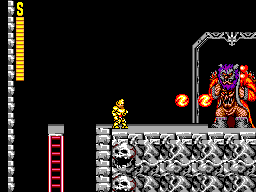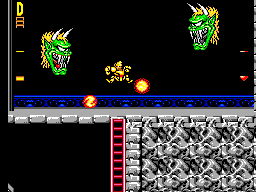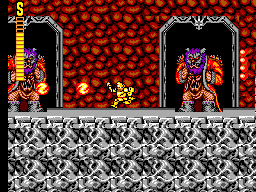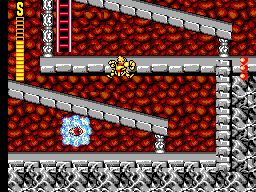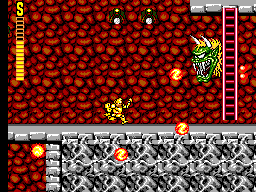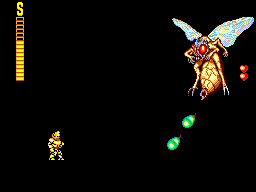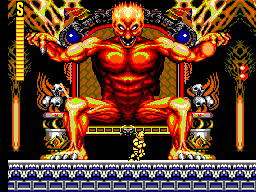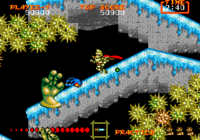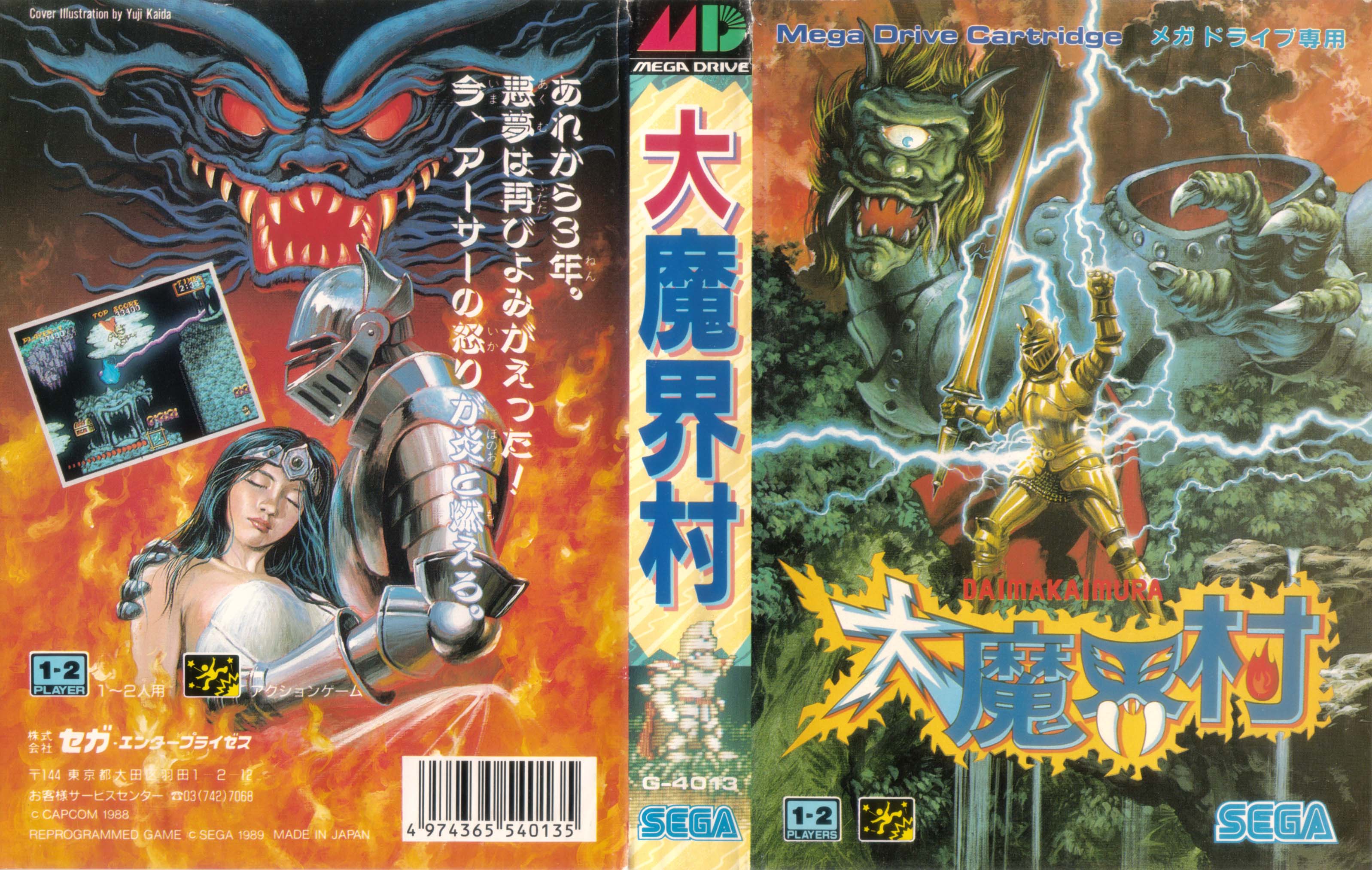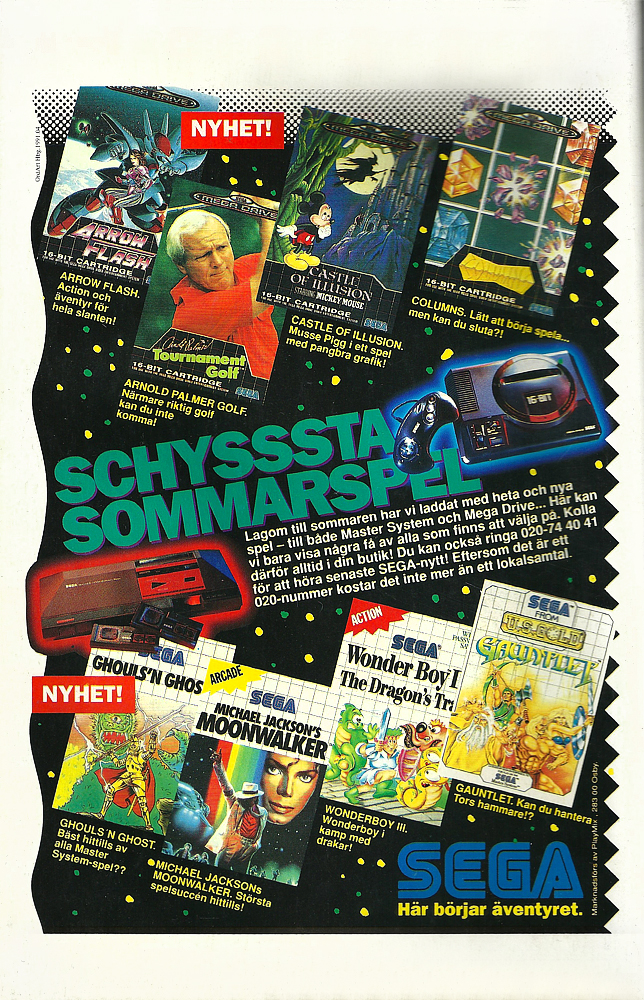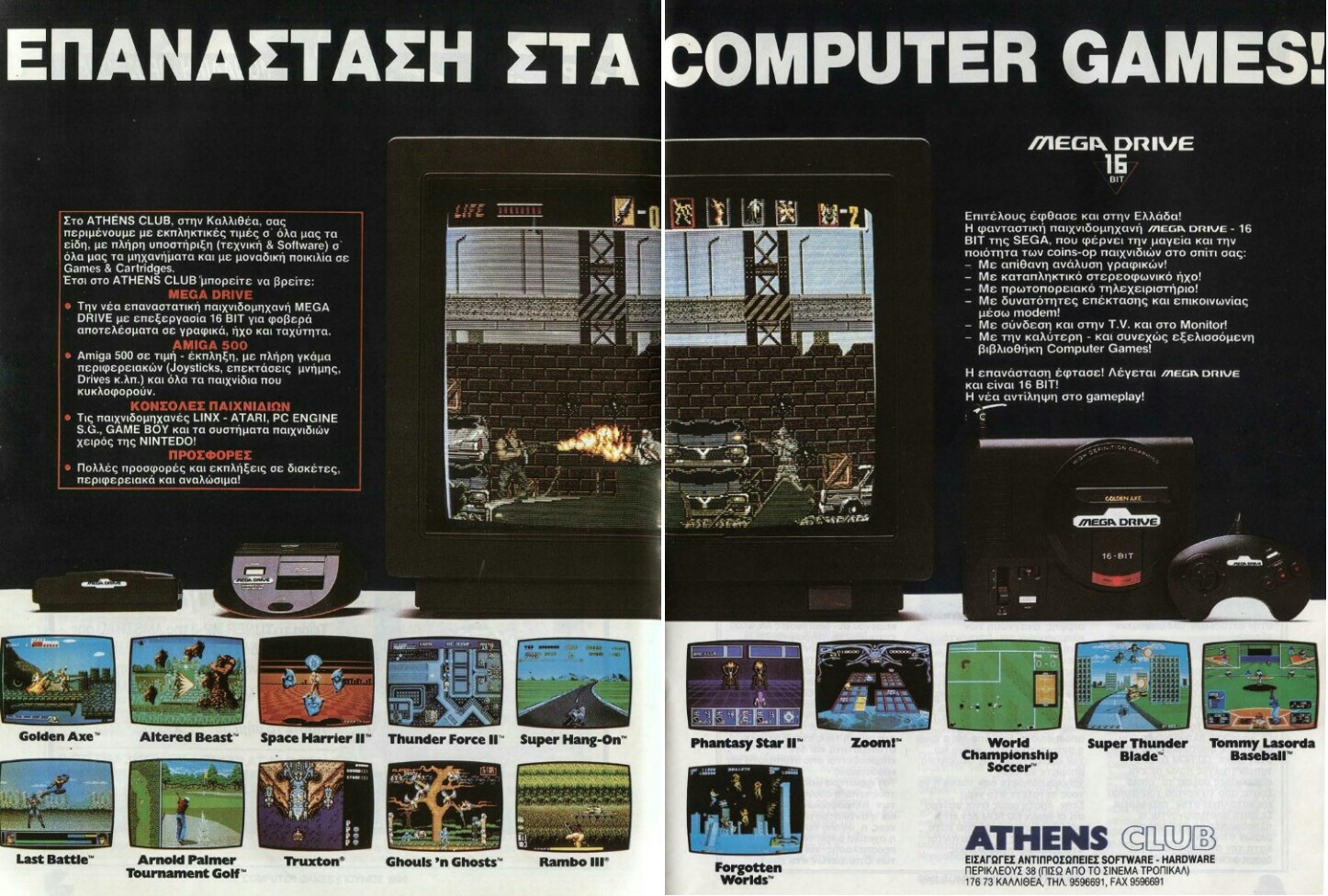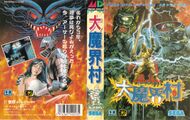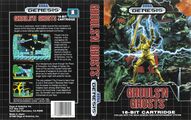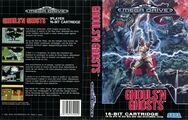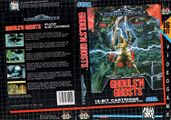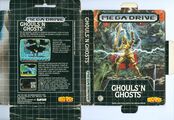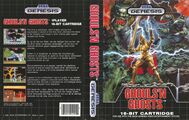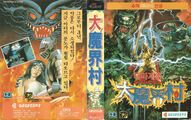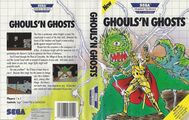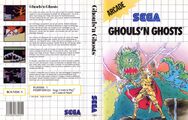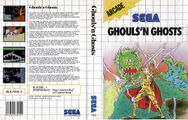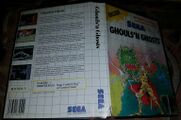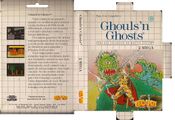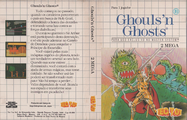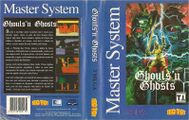Ghouls'n Ghosts
From Sega Retro
- For the Sega Saturn version, see Capcom Generation: Dai 2 Shuu Makai to Kishi.
Ghouls'n Ghosts, known in Japan as Daimakaimura (大魔界村), is an action platform game for the Sega Mega Drive and the Sega Master System. The Mega Drive version was developed by Sega R&D 2 and first released in Japan in August 1989. The Master System version was developed by Sega with Arc System Works and released in Western regions in 1991. Both games are ports of the 1988 Capcom arcade game Ghouls'n Ghosts.
Contents
Story
Loki (called Lucifer in the Japanese version), ruler of the Demon Realm, has taken the souls of everybody in the kingdom, including Princess Prin Prin. It falls upon Sir Arthur to again save his beloved princess and return the souls to the people of the kingdom.
Gameplay
Mega Drive version
Ghouls'n Ghosts is a side-scrolling action platform game played as the hapless knight Arthur, who must advance through a series of eerie stages and defeat a number of undead and demonic creatures. A boss guards a door at the end of each stage and bars the way forward. The game is notoriously difficult due to the constant waves of enemies and traps, with Arthur only having a couple of hit points with which to resist them.
Arthur moves with ![]() or
or ![]() and kneels with
and kneels with ![]() . He jumps with
. He jumps with ![]() or
or ![]() . He attacks by throwing a weapon with
. He attacks by throwing a weapon with ![]() . Initially, he throws lances, but he acquires different weapons during the journey (which replace his equipped weapon). Multiple weapons can be thrown consecutively (though the exact number depends on the type of weapon equipped). Arthur can attack while standing, kneeling, or jumping. He can attack directly upwards with
. Initially, he throws lances, but he acquires different weapons during the journey (which replace his equipped weapon). Multiple weapons can be thrown consecutively (though the exact number depends on the type of weapon equipped). Arthur can attack while standing, kneeling, or jumping. He can attack directly upwards with ![]() +
+![]() ; while in midair, he can attack directly downwards with
; while in midair, he can attack directly downwards with ![]() +
+![]() . He climbs ladders with
. He climbs ladders with ![]() and descends them with
and descends them with ![]() .
.
Arthur can pick up a variety of weapons and armor throughout the stages to help him in his quest. Finding the gold armor allows him to charge up his weapon by holding ![]() to release a powerful magical attack. Each weapon has its own special attack.
to release a powerful magical attack. Each weapon has its own special attack.
Arthur begins the game wearing a suit of plate armor. When he is injured, his armor falls off, leaving him wearing only his underwear. If he is injured without his armor, he turns into a skeleton and loses a life. Each stage has a checkpoint partway through and before the boss where Arthur is revived if he has passed it; otherwise, he must restart the stage from the beginning. Every stage also has a time limit, and Arthur dies if the time limit expires. Arthur starts with his armor again after losing a life. The game ends if the player runs out of lives. Extra lives are given every 30,000 points.
The game has two difficulty levels (Practice and Professional). The game has an alternating two-player mode, where two players can share the same control pad or use separate control pads.
Weapons
| Lance | |
|---|---|
| The initially equipped weapon. Throws lances straight ahead. Up to two lances can be out at a time.
The special ability sends lightning bolts directly upward and toward each side. | |
| Big Axe | |
| Throws axes at an upward angle. The axes penetrate through multiple targets, but only one axe can be out at a time.
The special ability creates a big burst of fire around Arthur. | |
| Super Sword | |
| The only melee weapon. It lacks the range of the other weapons but does twice as much damage.
The special ability releases Thunder Dragons into the air that fly around the screen. | |
| Fire Water | |
| Drops a concoction that burns blue flames along the ground.
The special ability shoots four fireballs that whirl around the screen. | |
| Discus | |
| Throws a discus forwards. When thrown from a kneeling position, it skids along the ground. Up to two discuses can be out at a time.
The special ability is conjuring a magic mirror that shields Arthur from enemy attacks. | |
| Dagger | |
| Throws a dagger forwards. Up to three daggers can be out at a time, and they fly faster than lances.
The special ability is creating a temporary mirrored version of Arthur who duplicates his movements. This double can damage enemies but cannot be defeated. | |
| Psycho Cannon | |
| The strongest weapon in the game (but the only that does not have a special ability). Shoots fireballs, though they cannot travel the full length of the screen before dissipating. The fireballs neutralize enemy projectiles and explode after hitting an enemy. These explosions can damage multiple enemies. This item is collected from the goddess in the first stage on the second playthrough if Arthur is wearing the gold armor. If it is lost, it can be found again as long as Arthur is wearing the gold armor. It is needed to fight the final boss. |
Items
| Treasure Chest | |
|---|---|
| Treasure chests occasionally erupt from the ground. This can sometimes be triggered by jumping in a certain spot. By firing his weapon at the chest, Arthur can uncover a weapon, armor, or an evil magician that changes Arthur into an elderly man (if he is unarmored) or a helpless duck (if he is wearing armor). | |
| Big Jar | |
| Big jars are carried by some enemies and contain an item. | |
| Weapons | |
| Changes Arthur's weapon. | |
| Red Armor | |
| Collect for 200 or 500 bonus points. | |
| Silver Armor | |
| Restores Arthur's armor. | |
| Magic Armor | |
| Upgrades Arthur's armor to a set of gold armor that gives him the ability to perform special charged abilities with his weapons. | |
| Key | |
| Dropped after defeating the boss at the end of each stage. Opens the gate leading to the next stage and restores Arthur's armor (if lost). |
Stages
To defeat the game, Arthur must complete stages 1 through 5 twice.
When reaching the entrance to Loki's chamber at the end of stage 5 on the first playthrough, the Archangel Gabriel appears and informs Arthur that he cannot defeat Loki without first receiving the magic power from the Goddess of Battle in the village.
Arthur is then taken back to the first stage. If he has the gold armor, the next treasure chest contains the goddess, who gives him the Psycho Cannon weapon. To enter Loki's chamber, Arthur must have this special weapon equipped. Otherwise, he is sent back to the beginning of stage 5.
| The Execution Place / The Floating Island on the Lake | |
|---|---|
| The Village of Decay / Town of Fire | |
| Baron Rankle's Tower / Horrible Faced Mountain | |
| The Crystal Forest | |
| Castle of Evil Demons | |
| Loki's Chamber | |
Master System version
The Master System game, like the Mega Drive version, reproduces the gameplay and the stages of the arcade version, but it features a unique power-up system. Players control the knight Arthur and fight hordes of enemies to reach the end of each stage, where a boss guards the gate to the next stage. Arthur moves with ![]() or
or ![]() and kneels with
and kneels with ![]() . He jumps with
. He jumps with ![]() . He climbs ladders with
. He climbs ladders with ![]() and descends them with
and descends them with ![]() .
.
Arthur attacks with ![]() by throwing a weapon. He can attack while standing, kneeling, or jumping. He can attack directly upwards with
by throwing a weapon. He can attack while standing, kneeling, or jumping. He can attack directly upwards with ![]() +
+![]() ; while in midair, he can attack directly downwards with
; while in midair, he can attack directly downwards with ![]() +
+![]() . Arthur can use a magical ability by holding
. Arthur can use a magical ability by holding ![]() to charge the ability and then releasing
to charge the ability and then releasing ![]() when the magic gauge starts flashing to cast it. Using a magical ability costs a segment of the magic gauge (with more advanced spells costing more bars). The player can change the current magical ability by pausing the game with PAUSE .
when the magic gauge starts flashing to cast it. Using a magical ability costs a segment of the magic gauge (with more advanced spells costing more bars). The player can change the current magical ability by pausing the game with PAUSE .
Arthur begins the game wearing a suit of plate armor. When he is injured, he loses a health point (depicted by a heart). When he only has one health point remaining, his armor falls off, leaving him wearing only his underwear. If he is injured without his armor, he turns into a skeleton and loses a life. Arthur starts with his armor again at the beginning of each stage or after losing a life. The game ends if the player runs out of lives.
Throughout the stages, Arthur uncovers mysterious treasure chests, which contain either an evil magician or a magical door. The magician casts a spell that temporarily transforms Arthur into a helpless duck (if he has armor on) or an old man (if he is in his underwear). The magical door leads to a chamber where Arthur can upgrade his armor or weapon or where Arthur can restore either his health or magic points. At the end of each stage, the door instead leads to a boss fight.
Arthur begins with a set of silver armor, but he can upgrade it over the course of the game to red, green, and gold armor, with each new color having improved characteristics. He has three armor pieces: the helmet, which gives him access to more magic spells as it is upgraded; the armor, which gives him more health points as it is upgraded; and the shoes, which increase his movement speed and jumping ability as they are upgraded. There are six weapons of increasing power, which are upgraded in sequence. Arthur retains his armor and weapon after losing a life. He cannot fight the final boss, Loki, unless he is wearing the highest-level armor pieces and armed with the most powerful weapon.
Weapons
Unlike other versions of the game, the weapons are collected in sequence, with each one representing an upgrade over the last in power. All of the weapons are projectiles, but none of them travel the full length of the screen.
| Javelin | |
|---|---|
| The initially equipped weapon. Throws javelins in a straight line. Up to two lances can be out at a time. | |
| Dagger | |
| Throws a dagger forwards. Up to three daggers can be out at a time. | |
| Axe | |
| Throws axes, which fly at an upward angle. Up to two axes can be out at a time. | |
| Discus | |
| Throws a discus forwards. Discuses can roll over obstacles and uneven terrain. Up to two discuses can be out at a time. | |
| Fireball | |
| Shoots fireballs. Up to four fireballs can be out at a time. | |
| Cannon | |
| Shoots fireballs. Up to two fireballs can be out at a time. This item is collected from the goddess after entering a magic door if Arthur is wearing all gold armor pieces, armed with the Fireball weapon, and on the second playthrough. It is the most powerful weapon, and Arthur can only fight the final boss if he possesses this weapon. |
Magic
Magic abilities are separate from weapons in this version of the game.
| Fire Magic | |
|---|---|
| Four fireballs burst diagonally from Arthur. This ability is initially available and costs 1 magic point to use. | |
| Thunder Magic | |
| Lightning bolts zap out from Arthur upwards and towards each side. This ability is initially available and costs 1 magic point to use. | |
| Shield Magic | |
| Arthur is temporarily rendered impervious to damage. Arthur must be wearing the red helmet to use this ability. It costs 2 magic points to use. | |
| Double Magic | |
| A duplicate of Arthur appears and temporarily fights alongside him. The double can attack enemies but cannot be harmed by them. Arthur must be wearing the green helmet to use this ability. It costs 4 magic points to use. | |
| Bomb Magic | |
| A magic bomb erupts that damages all enemies on the screen. Arthur must be wearing the gold helmet to use this ability. It costs 6 magic points to use. | |
| Life Magic | |
| Restores Arthur's health. Arthur must be wearing the gold helmet and armed with the Cannon to use this ability. It costs 8 magic points to use. |
Items
| Treasure Chest | |
|---|---|
| Treasure chests occasionally erupt from the ground. This can sometimes be triggered by jumping in a certain spot. By firing his weapon at the chest, Arthur can reveal either an evil magician or a magical door. | |
| Key | |
| Dropped after defeating the boss at the end of each stage. Opens the gate leading to the next stage and restores Arthur's armor (if lost). |
Stages
To defeat the game, Arthur must complete stages 1 through 5 twice.
When reaching the entrance to Loki's chamber at the end of stage 5 on the first playthrough, the Archangel Gabriel appears and informs Arthur that he cannot defeat Loki without first receiving the magic power from the Goddess of Battle, and he is sent back to the first stage.
If Arthur is wearing all gold armor pieces and equipped with the Fireball weapon, the goddess appears at the next door that would otherwise send him to an upgrade chamber and gives him the Cannon weapon. To enter Loki's chamber, Arthur must have this special weapon equipped. Otherwise, he is sent back to the beginning of stage 5.
| The Hill of Torture | |
|---|---|
| Maps: 1️⃣ | 2️⃣ | |
| The Village of Decay and Destruction | |
| Maps: 1️⃣ | 2️⃣ | |
| Baron Rankle's Tower | |
| Maps: 1️⃣ | 2️⃣ | |
| The Crystal Forest | |
| Maps: 1️⃣ | 2️⃣ | |
| The Castle | |
| Maps: 1️⃣ | 2️⃣ | |
| Loki's Chamber | |
| Map: 1️⃣ | |
History
Development
Programming
The Mega Drive version of Ghouls'n Ghosts was handled by Sega R&D 2,[1] developed over 5 months.[29][30] Main programmer Yuji Naka accepted the offer to port Ghouls'n Ghosts shortly after completing Phantasy Star II in December 1988,[31] which was also programmed in part by this game's sub programmer Com Blue. The two also programmed Super Thunder Blade and the first Phantasy Star before that. Naka picked this project as, being a native of the Kansai region, he would need to travel to Capcom's headquarters in Osaka, Kansai, to collect arcade materials. This single trip could double as a visit to his parent's house nearby, saving him money.[32]
Yuji Naka has also said he asked to work on the port due to being impressed with the arcade game when it was demonstrated at Amusement Machine Show 1988,[33] with the sloped hills being the most interesting aspect, at a time when diagonal ground movement was rare in side-scrolling platformers.[34] He visited Capcom a month after the AM Show when the arcade game released[35] (also a month after the release of Super Thunder Blade), acquiring the source code and ROM data, being horrified to learn the program alone took up more than the 4 megabits (512 kilobytes) Mega Drive cartridges typically had at the time, and so didn't know how he would then also include the graphics. As a result, it required a great deal of compression and inserting graphics into odd places in the code.[34]
While these tricks did work, Ghouls'n Ghosts was still impossible to fit into just 512kB. The team began to overestimate how much they could add and how accurate they could be, and eventually ran out of space. Rather than compromise and remove content, Naka pleaded with executives to add an extra 128kB to the cartridge.[35]
| “ | We got it into a reasonable shape, to the point where we thought, "We're so close, we can make it basically arcade-perfect!" But when we got to the point where we were just about make it arcade-accurate, we ran out of space. I didn't want to make cuts, so I begged the company, "I'm really sorry, please add just one more megabit......" so it could be 5M.
Because of my persistence, Ghouls'n Ghosts is the only Mega Drive game to have the rudimentary "5MEGA ROM". |
„ |
Due to what he learned during its development, Naka has directly credited Ghouls'n Ghosts for paving the way towards Sonic the Hedgehog,[35][36][37] as slopes and 360 degree loops play a big role in Sonic's level design and movement.[38]
Music and Sound
One of the most challenging aspects of development, besides the tight deadline, was the audio.[32] The sound driver for the game used the driver from Capcom's CP System,[39] reprogrammed by Izuho Numata with programmer S.[40] Numata had very little experience with assembly, the language it was written in, so the programmers patiently guided her along the way.[41] While there were still problems with her new sound driver, including a major one that she was scolded by the director for,[42] senior sound engineer Kazuhiko Nagai was brought in to do checks on it and make corrections.[41][43]
As the Mega Drive supported fewer tones than the CP System,[32] Numata had to spend a long time carefully deciding which tones to cut. Kazuhiko Nagai eased her workload by creating the sound effects.[44][43]
Legacy
The Mega Drive release, was a notable milestone in the console's first couple of years. At the time, it was considered the most accurate home version of the game. In the West, it was billed as a selling point for the Mega Drive system during its first few months, retailing at a higher price than most games available for the console at the time. It also marks the beginning of Sega's relationship with the then-industry powerhouse Capcom, who, until this point, had avoided releasing games for Sega systems.
The Mega Drive version was re-released as part of the Wii's Virtual Console service in 2007. It was also included as part of the Mega Drive Mini in 2019.
The original arcade game was ported to the Sega Saturn in Japan in 1998 as part of Capcom Generation: Dai 2 Shuu Makai to Kishi.
Versions
Localised names
| Language | Localised Name | English Translation |
|---|---|---|
| English | Ghouls'n Ghosts | Ghouls'n Ghosts |
| English (US) | Ghouls'n Ghosts | Ghouls'n Ghosts |
| Japanese | 大魔界村 | Daimakaimura |
Production credits
- Main article: Ghouls'n Ghosts/Production credits.
Mega Drive version
- Cover Illustration by: Yuji Kaida
Master System version
- Director: Katsuhiro Hasegawa[49]
- Izuho Numata[50]
Digital manuals
Magazine articles
- Main article: Ghouls'n Ghosts/Magazine articles.
Promotional material
also published in:
- (UK) #107: "October 1990" (1990-09-16)[51]
Artwork
Physical scans
Mega Drive version
| Sega Retro Average | |||||||||||||||||||||||||||||||||||||||||||||||||||||||||||||||||||||||||||||||||||||||||||||||||||||||||||||||||||||||||||||||||||||||||||||||||||||||||||||||||||||||||||||||||||||||||||||
|---|---|---|---|---|---|---|---|---|---|---|---|---|---|---|---|---|---|---|---|---|---|---|---|---|---|---|---|---|---|---|---|---|---|---|---|---|---|---|---|---|---|---|---|---|---|---|---|---|---|---|---|---|---|---|---|---|---|---|---|---|---|---|---|---|---|---|---|---|---|---|---|---|---|---|---|---|---|---|---|---|---|---|---|---|---|---|---|---|---|---|---|---|---|---|---|---|---|---|---|---|---|---|---|---|---|---|---|---|---|---|---|---|---|---|---|---|---|---|---|---|---|---|---|---|---|---|---|---|---|---|---|---|---|---|---|---|---|---|---|---|---|---|---|---|---|---|---|---|---|---|---|---|---|---|---|---|---|---|---|---|---|---|---|---|---|---|---|---|---|---|---|---|---|---|---|---|---|---|---|---|---|---|---|---|---|---|---|---|---|
|
| 87 | |
|---|---|
| Based on 37 reviews | |
| Mega Drive, SE (rental; Kanal 10) |
|---|
| Mega Drive, BX† |
|---|
| Mega Drive, CZ/SK (ITO CS) |
|---|
| Mega Drive, BR (Plastic Case) |
|---|
|
Master System version
| Sega Retro Average | |||||||||||||||||||||||||||||||||||||||||||||||||||||||||||||||||||||||||||||||||||||||||||||||||||||||||||||||||||||||
|---|---|---|---|---|---|---|---|---|---|---|---|---|---|---|---|---|---|---|---|---|---|---|---|---|---|---|---|---|---|---|---|---|---|---|---|---|---|---|---|---|---|---|---|---|---|---|---|---|---|---|---|---|---|---|---|---|---|---|---|---|---|---|---|---|---|---|---|---|---|---|---|---|---|---|---|---|---|---|---|---|---|---|---|---|---|---|---|---|---|---|---|---|---|---|---|---|---|---|---|---|---|---|---|---|---|---|---|---|---|---|---|---|---|---|---|---|---|---|---|
|
| 76 | |
|---|---|
| Based on 23 reviews | |
| Master System, BX† |
|---|
Mega-Tech version
| Mega-Tech, |
|---|
|
Technical information
- Main article: Ghouls'n Ghosts/Technical information.
ROM dump status
| System | Hash | Size | Build Date | Source | Comments | |||||||||
|---|---|---|---|---|---|---|---|---|---|---|---|---|---|---|
| ✔ |
|
640kB | 1989-06 | Cartridge (US/EU) | Revision 02 | |||||||||
| ✔ |
|
640kB | 1989-06 | Cartridge (US/EU) | Revision 01 | |||||||||
| ✔ |
|
640kB | 1989-06 | Cartridge (JP) | ||||||||||
| ? |
|
256kB | Cartridge (EU/US) |
External links
- Sega of Japan Virtual Console pages: Mega Drive
- Nintendo catalogue pages: US, UK, AU
References
NEC Retro has more information related to Daimakaimura
|
- ↑ 1.0 1.1 @nakayuji on Twitter (Wayback Machine: 2022-04-28 19:00)
- ↑ 3.0 3.1 File:GnG MD JP Box.jpg
- ↑ 4.0 4.1 https://sega.jp/history/hard/megadrive/software.html (Wayback Machine: 2020-07-20 09:51)
- ↑ File:GnG SMS EU Box 6.jpg
- ↑ Computer Entertainer, "December 1989" (US; 1989-12-18), page 14
- ↑ 7.0 7.1 VideoGames & Computer Entertainment, "January 1990" (US; 19xx-xx-xx), page 50
- ↑ Mean Machines, "October 1990" (UK; 1990-09-xx), page 76
- ↑ Raze, "January 1991" (UK; 1990-11-29), page 61
- ↑ ACE, "October 1990" (UK; 1990-09-xx), page 51
- ↑ 11.0 11.1 Player One, "Octobre 1990" (FR; 1990-xx-xx), page 56
- ↑ Electronic Gaming Monthly, "January 1991" (US; 199x-xx-xx), page 24
- ↑ 13.0 13.1 Mean Machines, "April 1991" (UK; 1991-04-01), page 82
- ↑ 14.0 14.1 Computer & Video Games, "May 1991" (UK; 1991-04-14), page 74
- ↑ Sega Power, "June 1991" (UK; 1991-05-02), page 19
- ↑ 16.0 16.1 Ação Games, "Junho 1991" (BR; 1991-06-19), page 16
- ↑ 17.0 17.1 http://www.nintendolife.com:80/games/megadrive/ghouls_n_ghosts (Wayback Machine: 2017-07-22 15:15)
- ↑ https://www.nintendo.co.uk/Games/Virtual-Console-Wii-/Ghouls-n-Ghosts--277457.html (archive.today)
- ↑ 19.0 19.1 http://www.nintendo.com/games/detail/aI9Z0vELsfnXIv8965H4zUj9rHC01wIm (Wayback Machine: 2010-11-23 02:20)
- ↑ https://www.nintendo.co.jp/wii/vc/software/04.html (Wayback Machine: 2018-03-05 23:40)
- ↑ http://vc.sega.jp:80/vc_daimakaimura/ (Wayback Machine: 2007-08-13 07:56)
- ↑ http://www.nintendo.com.au/index.php?action=catalogue&prodcat_id=41&prod_id=19745&pageID=4 (Wayback Machine: 2012-04-03 02:06)
- ↑ https://topics.nintendo.co.jp/article/c33d8753-7d81-46bd-80cb-1e0a80dbae98 (archive.today)
- ↑ @NintendoAmerica on Twitter (archive.today)
- ↑ @NintendoEurope on Twitter (archive.today)
- ↑ @NintendoUK on Twitter (archive.today)
- ↑ @NintendoAUNZ on Twitter (archive.today)
- ↑ http://shmuplations.com/sonicteam/
- ↑ [[28] [28]]
- ↑ @nakayuji on Twitter (Wayback Machine: 2022-07-02 05:54)
- ↑ Phantasy Star II#Technical information
- ↑ 32.0 32.1 32.2 32.3 32.4 32.5 32.6 Sega Players Enjoy Club, "Vol. 4" (JP; 1989-10-20), page 2
- ↑ @nakayuji on Twitter (Wayback Machine: 2022-04-28 18:59)
- ↑ 34.0 34.1 34.2 https://news.denfaminicogamer.jp/megadrivecx/kibe2#i-2 (Wayback Machine: 2023-09-16 18:35)
- ↑ 35.0 35.1 35.2 Sega Consumer History, Enterbrain, page 38
- ↑ @nakayuji on Twitter (Wayback Machine: 2022-04-28 18:59)
- ↑ @nakayuji on Twitter (Wayback Machine: 2022-07-04 04:37)
- ↑ https://game.watch.impress.co.jp/docs/news/529521.html (Wayback Machine: 2021-11-28 23:23)
- ↑ [ ]
- ↑ @mito_chusui on Twitter
- ↑ 41.0 41.1 @mito_chusui on Twitter
- ↑ @mito_chusui on Twitter
- ↑ 43.0 43.1 43.2 https://sbtransr02.wixsite.com/kazuhiko-nagai/my-works-1 (Wayback Machine: 2021-04-10 08:56)
- ↑ @mito_chusui on Twitter
- ↑ Ultra Game Players, "November 1997" (US; 1997-10-14), page 36
- ↑ @mito_chusui on Twitter (Wayback Machine: 2022-12-08 18:47)
- ↑ Mega Drive Fan, "October 1992" (JP; 1992-09-xx), page 47
- ↑ File:SegaAges2500V17_PS2_JP_Leaflet.PDF, page 2
- ↑ https://sega.jp/fb/album/06_sdi/interview1.html (Wayback Machine: 2021-10-16 21:52)
- ↑ https://vgmdb.net/forums/showpost.php?p=62712&postcount=14 (Wayback Machine: 2023-09-07 21:17)
- ↑ Computer & Video Games, "October 1990" (UK; 1990-09-16), page 122
- ↑ 1700 igr dlya Sega, "" (RU; 2001-xx-xx), page 88
- ↑ ACE, "November 1989" (UK; 1989-10-xx), page 144
- ↑ Aktueller Software Markt, "Oktober 1989" (DE; 1989-08-28), page 60
- ↑ Beep! MegaDrive, "February 1990" (JP; 1990-01-08), page 72
- ↑ Complete Guide to Consoles, "" (UK; 1989-10-16), page 38
- ↑ Complete Guide to Consoles, "Volume IV" (UK; 1990-11-xx), page 30
- ↑ The Complete Guide to Sega, "" (UK; 1991-05-xx), page 47
- ↑ Console XS, "June/July 1992" (UK; 1992-04-23), page 130
- ↑ Computer & Video Games, "October 1989" (UK; 1989-09-16), page 116
- ↑ Electronic Gaming Monthly, "December 1989" (US; 1989-xx-xx), page 62
- ↑ Entsiklopediya luchshikh igr Sega. Vypusk 1, "" (RU; 1999-xx-xx), page 318
- ↑ Entsiklopediya luchshikh igr Sega. Vypusk 5, "" (RU; 200x-xx-xx), page 157
- ↑ Mean Machines: The Essential Sega Guide, "" (UK; 1993-11-18), page 51
- ↑ Famitsu, "" (JP; 1989-xx-xx), page 1
- ↑ Games Preview, "8/9 1989" (DK; 1989-xx-xx), page 70
- ↑ Hobby Consolas, "Febrero 1992" (ES; 1992-0x-xx), page 76
- ↑ Joystick, "Septembre 1990" (FR; 1990-0x-xx), page 90
- ↑ Sega Mega Drive Advanced Gaming, "October 1992" (UK; 1992-xx-xx), page 78
- ↑ Sega Mega Drive Advanced Gaming, "January 1993" (UK; 199x-xx-xx), page 92
- ↑ Mega Drive Fan, "January 1990" (JP; 1989-12-08), page 73
- ↑ Mega Action, "June 1993" (UK; 1993-05-20), page 65
- ↑ Mega Fun, "10/93" (DE; 1993-09-22), page 42
- ↑ MegaTech, "Xmas 1991" (UK; 1991-12-06), page 78
- ↑ Micromanía (segunda época), "Enero 1991" (ES; 199x-xx-xx), page 36
- ↑ Mean Machines, "October 1990" (UK; 1990-09-xx), page 74
- ↑ Mean Machines Sega, "October 1992" (UK; 1992-09-xx), page 139
- ↑ Power Play, "11/89" (DE; 1989-10-09), page 58
- ↑ Raze, "January 1991" (UK; 1990-11-29), page 60
- ↑ Sega Power, "February 1991" (UK; 1991-01-03), page 18
- ↑ Sega Power, "October 1991" (UK; 1991-09-05), page 53
- ↑ 82.0 82.1 Sega Pro, "Christmas 1991" (UK; 1991-12-12), page 19
- ↑ Sega Pro, "April 1993" (UK; 1993-03-11), page 65
- ↑ Sega Saturn Magazine, "September 1995" (JP; 1995-08-08), page 85
- ↑ Tricks 16 bit, "Tricks Sega Gold 800 igr" (RU; 1998-03-20), page 81
- ↑ Zzap!, "Dicembre 1990" (IT; 1990-xx-xx), page 70
- ↑ Aktueller Software Markt, "August/September 1991" (DE; 1991-07-26), page 118
- ↑ The Complete Guide to Sega, "" (UK; 1991-05-xx), page 20
- ↑ Console XS, "June/July 1992" (UK; 1992-04-23), page 141
- ↑ Electronic Gaming Monthly, "January 1991" (US; 199x-xx-xx), page 20
- ↑ Mean Machines: The Essential Sega Guide, "" (UK; 1993-11-18), page 137
- ↑ (UK) (+0:00)
- ↑ GamePro, "April 1991" (US; 1991-xx-xx), page 62
- ↑ Games-X, "31st May-6th June 1991" (UK; 1991-05-31), page 22
- ↑ Hobby Consolas, "Diciembre 1991" (ES; 1991-1x-xx), page 78
- ↑ Joystick, "Mai 1991" (FR; 1991-0x-xx), page 173
- ↑ Micromanía (segunda época), "Julio 1991" (ES; 1991-0x-xx), page 36
- ↑ Mean Machines, "April 1991" (UK; 1991-04-01), page 80
- ↑ Player One, "Juin 1991" (FR; 1991-xx-xx), page 24
- ↑ Power Play, "5/91" (DE; 1991-04-12), page 138
- ↑ Raze, "August 1991" (UK; 1991-06-27), page 47
- ↑ Sega Power, "June 1991" (UK; 1991-05-02), page 18
- ↑ Sega Power, "October 1991" (UK; 1991-09-05), page 57
- ↑ Sega Pro, "April 1993" (UK; 1993-03-11), page 71
- ↑ User, "Mártios 1992" (GR; 1992-0x-xx), page 87
- ↑ Video Games, "1/91" (DE; 1991-03-27), page 76
| Ghouls'n Ghosts | |
|---|---|
|
Main page | Comparisons | Maps | Hidden content | Bugs | Magazine articles | Video coverage | Reception | Region coding | Technical information | |
- 1-2 player games
- JP Mega Drive games
- All JP games
- US Mega Drive games
- All US games
- US Sega Channel games
- EU Mega Drive games
- All EU games
- BX Mega Drive games
- All BX games
- FR Mega Drive games
- All FR games
- PT Mega Drive games
- All PT games
- UK Mega Drive games
- All UK games
- SE Mega Drive games
- All SE games
- CZ Mega Drive games
- All CZ games
- AU Mega Drive games
- All AU games
- CA Mega Drive games
- All CA games
- BR Mega Drive games
- All BR games
- KR Mega Drive games
- All KR games
- Mega Drive games
- 1989 Mega Drive games
- All 1989 games
- Mega Drive action games
- All action games
- US Master System games
- EU Master System games
- UK Master System games
- AU Master System games
- BR Master System games
- KR Master System games
- Master System games
- 1991 Master System games
- All 1991 games
- Master System action games
- All arcade games
- Mega-Tech games
- Unknown year games
- JP Wii Virtual Console games
- US Wii Virtual Console games
- EU Wii Virtual Console games
- AU Wii Virtual Console games
- Wii games
- 2007 Wii games
- All 2007 games
- Wii Virtual Console games
- JP Nintendo Switch Online games
- US Nintendo Switch Online games
- EU Nintendo Switch Online games
- UK Nintendo Switch Online games
- AU Nintendo Switch Online games
- Nintendo Switch games
- 2023 Nintendo Switch games
- All 2023 games
- Nintendo Switch Online games
- All games
- Bad translation
- Credits without reference
- Old technical information
- Ghouls'n Ghosts
- Mega Drive Mini games
